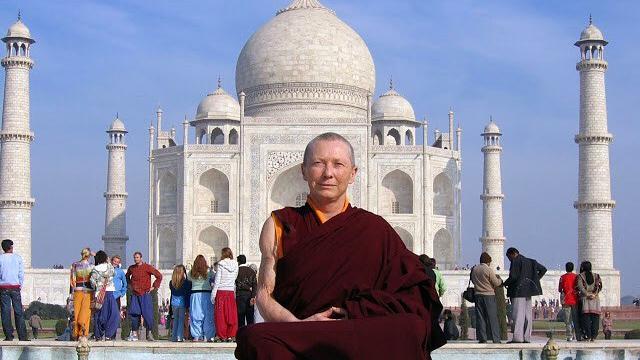Ven. Karma Lekshe Tsomo is a scholar, activist, and one of the founding members of Sakyadhita, the international organization working to unite women across the globe.
In some religions, chanting helps to settle the mind and prepare it for meditation. As much of the world lives in isolation due to the coronavirus outbreak, many have suggested using the time to meditate and be in the here and now.
Buddhists believe the path to enlightenment requires periods of detachment from the world — so self-quarantine offers an opportunity.
Karma Lekshe Tsomo is a Buddhist nun and social activist who splits her time between India and the US. She is from California and was an avid surfer growing up — a practice that she says helped prepare her to embrace Buddist teachings. After being ordained in 1977, she has worked on nonprofits focused on Buddhist women and education.
Lekshe is also a professor of Buddhism and world religions at the University of San Diego. She spoke with The World’s Marco Werman about the role of meditation and reflection during the spread of COVID-19.
Related: ‘Kung Fu’ nuns empower women at risk of climate-caused trafficking
Marco Werman: Was there a moment in your life that prepared you for this pandemic?
Karma Lekshe Tsomo: It happened to me in India about 30 years ago when I got bitten by a viper, a poisonous snake, and my whole world changed in that one moment. I faced death head-on for three months, not knowing from day to day whether I would be alive tomorrow. This really taught me the value of these teachings on how to be completely in the present moment. Let go of the past. Let go of the future, and focus completely on this precious, present moment.
So the teachings on impermanence, for example, teach that all things change. Why are we surprised? The Buddha taught that beings encounter unpleasantness and suffering in life. It’s unavoidable. So again, why are we surprised? Clinging to our expectations that life is supposed to be a bowl of cherries only makes us unhappy and dissatisfied. If we accept the reality of the human condition, then we can accept these things. We can understand.
Related: How American Buddhism evolved into something distinct and its own
The narrative of many religions is one turns to God or Allah or Yaweh. What does Buddha tell you to do right now, as a Buddhist leader?
There are so many different teachings and so many of them apply to this situation. Like, for example, a lot of people are feeling restricted. They’re feeling angry. They’re not liking confinement. And yet, our situation, whatever it may be, can’t be compared to the sufferings of refugees in the camps, who are struggling even for water and food. So loving kindness is an excellent method for cutting through our own anger and aversion. Also, the teaching on compassion for the sufferings of others — not to turn away, but [use] whatever resources we have to try to contribute to relieve the sufferings of others.
Another teaching would be contentment. The Buddha said that contentment is the greatest wealth. So, no matter what inconveniences or sufferings that we are personally experiencing right now, contentment helps us to cope with unfulfilled situations and unfulfilled expectations. And it’s a real remedy for dissatisfaction, the kinds of dissatisfactions that people are feeling by having to stay inside.
Right in the moment, though, for people who are facing death of a loved one or have just experienced that, what solace or guidance can Buddhism give them?
Well, the Buddhist teachings give us lots of practices for how to calm the mind. So it may seem a bit idealistic, on the other hand, it could be survival, to cultivate a calm and quiet mind. If we’re frantic, if we’re panicked, we can’t really be a resource for those around us. So they have a practice of mindfulness, of breathing. It’s a very simple practice that can be done by anyone of any religion or no religion, just simply to be aware of the gentle flow of our breath as it flows in and flows out. In other words, to just calm down, be completely in the moment and be aware of our own breathing.
Another practice would be to be flexible, to be able to flow with the circumstances, pleasant or unpleasant. This is called the practice of equanimity. You know, usually we reel from, you know, highs and lows, and we’re on a roller coaster of emotions. And in this case, we bring a suffering to ourselves and also disturb those around us. So if we can handle any circumstance calmly, then we’ll be happier campers. And the people around us will certainly appreciate it, too.
Related: When does life begin? It might depend on your faith.
I just want to point out that your childhood was spent in Southern California and you’re a surfer — were, anyway. I think surfers, it’s a lifelong thing. You were top-ranked in your teens, though. Do you still surf? What is the connection to Buddhism?
Well, when I was young, my whole life was surfing. I mean, I dreamed surfing. So I am very grateful for being in touch with the ocean, having this opportunity to be in solitude. It gave me a kind of perspective. You know, when you’re out in the ocean waiting for a set, you see the world from a different viewpoint. You recognize that you’re basically alone in the universe, but also that you’re not the most important thing in the universe. So I’m really grateful for that. You learn to be quiet in the present moment, to be prepared for any situation.
This interview has been edited and condensed for clarity.
